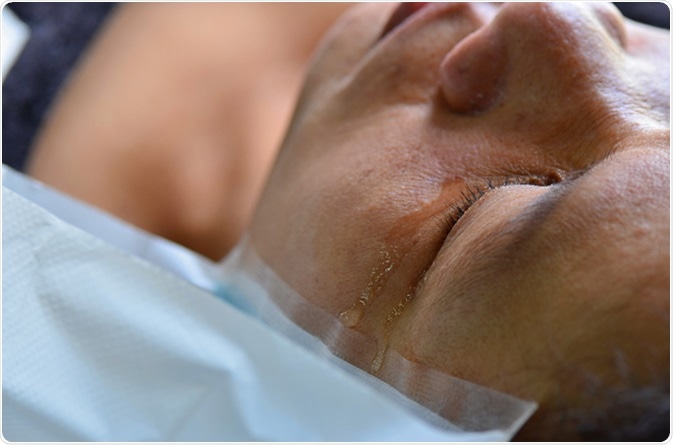An eye injury is a medical emergency. Delaying medical attention could lead to permanent vision loss or blindness.

Image Credit: Anukool Manoton / Shutterstock
What is an Eye Injury?
The eye consists of structures that are designed to protect it from various injuries. However, accidents may happen that subvert these protective layers and result in an eye injury.
Eye injuries are the most common preventable cause of blindness. Though many people experience minor eye irritations at some point in their lives, serious eye injuries need immediate medical attention.
The American Academy of Ophthalmology reports that about 2.4 million eye injuries happen in the United States each year. Approximately 35 percent of all injuries happen in individuals between the ages of 18 and 45.
An estimated 90 percent of all eye injuries can be prevented through the use of protective eyewear. In the labor sector, more than 2,000 people injure their eyes during work and 10 to 20 percent of all work-related injuries will cause permanent or temporary blindness.
How to Recognize an Eye Injury
Serious eye injuries may lead to blindness. Hence, it is vital to recognize an injury immediately. The appropriate response is also crucial. If you notice any of the following signs in yourself or another person, make it a point to get medical help right away.
- Visual impairment
- Eye pain
- Eyelid laceration or cut
- One eye is not moving well
- Unusual pupil size
- Blood on the conjunctiva
- Foreign body in the eye or under the eyelid
- One eye protrudes
Causes of an Eye Injury
A blow to the eye with a hard or blunt object may damage any part, including the eyelids, eyes, muscles, and bones surrounding the eye.
Following mild impact, the patient may have a swollen eyelid or black eye. In severe cases, bleeding may occur.
Another common cause of eye injury is a foreign body lodged in the eye. Anything may be lodged in the eye such as sand, metal shavings, wood chips or glass slivers. In such situations, it is important to see an eye specialist or call an ambulance right away.
Metal foreign bodies may cause more severe eye injuries. Small metallic fragments may not cause immediate symptoms, but these may result in retinal cell damage and death.
Chemicals may also cause eye injuries. Usually, the culprits include household cleaners, acids, and bases. These chemicals may damage the eye and cause irritation. Among the most dangerous chemicals are alkalis, including drain cleaners, oven cleaners, and fertilizers. These chemicals may lead to blindness. Other acids such as bleach may cause mild injury.
A cut or scratch can cause corneal damage. This may occur with a finger, stick or other objects accidentally coming into forcible contact with the cornea and scratching it. The usual symptoms of this type of injury include light sensitivity, blurred vision, redness, pain and excessive tears.
How to Treat an Eye Injury
Any type of eye injury needs a thorough examination by a medical practitioner. For minor eye injuries, first aid can be applied while waiting for the ambulance to arrive.
Remember that for all eye injuries, the eye must not be rubbed, touched or pressed. If a foreign body is lodged or stuck in the eye, do not remove it. If sand or other small grains have got in, a sterile eyewash solution may be used to wash it out, but if this does not work, medical help is required immediately. As far as possible, an eye specialist should be visited right away.
For a suspected eye puncture, the injured part should not be rinsed with water and the object should be left untouched. A shield over the eye may help. A simple way to apply a shield is to cut the bottom of a paper cup and tape it to the bones that surround the eye. Bring the patient to the emergency room or wait for the ambulance to arrive.
For chemical eye injuries, flush the eye with clean water. Do this until all the chemical has been washed away from the eye. For injuries caused by blows to the eye, apply a small cold compress to help reduce swelling. But no pressure should be applied on the eye.
The best thing to do is bring the patient to an eye doctor right away for appropriate medical attention. Any type of eye injury may lead to serious complications such as temporary or permanent vision loss.
Further Reading
Last Updated: Feb 27, 2019